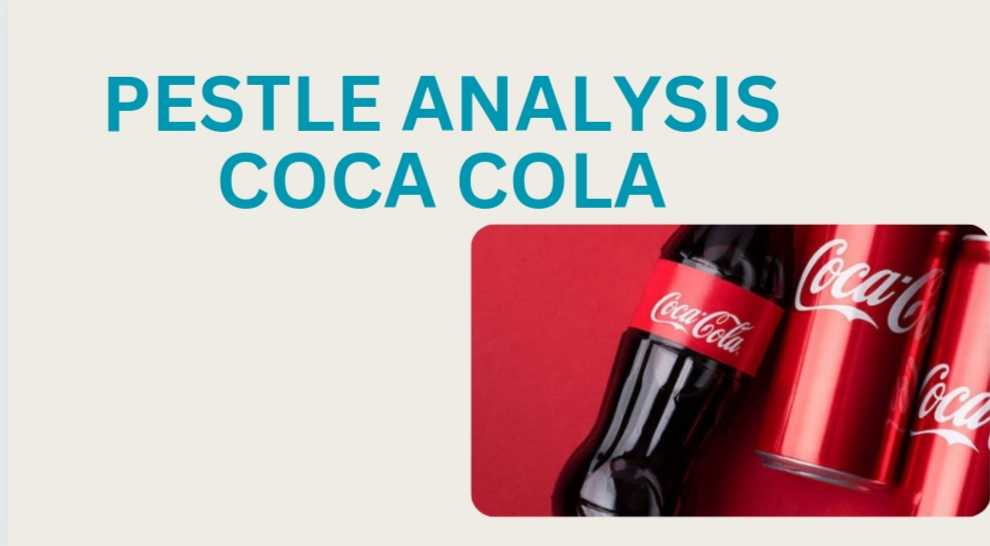Conducting a PESTLE analysis offers valuable insights into the external factors impacting the strategic landscape of a company. Coca-Cola, as a global beverage giant, operates within a complex ecosystem influenced by political, economic, social, technological, legal, and environmental factors. This analysis provides a comprehensive understanding of the macro-environmental forces shaping Coca-Cola’s operations, enabling the company to navigate challenges effectively and capitalize on emerging opportunities. By scrutinizing these external factors, Coca-Cola can refine its strategies, enhance its competitive positioning, and sustain long-term growth in an ever-evolving market landscape.
Table of Contents
TogglePolitical Factors Coca-Cola
Political factors significantly impact Coca-Cola’s operations on a global scale. Regulatory policies, trade agreements, and governmental stability in various regions directly affect the company’s business environment. Coca-Cola must navigate a multitude of political landscapes, ensuring compliance with regulations related to product labeling, advertising, and health standards. Additionally, taxation policies, trade barriers, and political instability in certain markets can influence production costs, distribution channels, and market access for Coca-Cola products. Moreover, the company must adapt its strategies to address geopolitical tensions and changes in government leadership that may impact its supply chain, production facilities, and market expansion efforts. Overall, staying attuned to political developments worldwide is crucial for Coca-Cola to mitigate risks and seize opportunities for sustainable growth.
Economic Factors Coca-Cola
Coca-Cola, as a multinational corporation, operates within a complex economic environment shaped by various factors. One of the key considerations is consumer income levels, which directly impact the demand for Coca-Cola products. During periods of economic prosperity, consumers tend to have higher disposable incomes, leading to increased spending on beverages like Coca-Cola. However, during economic downturns, consumers may prioritize essential purchases over discretionary items, potentially reducing demand for Coca-Cola’s products. Exchange rates also pose a significant economic consideration for Coca-Cola, given its global presence. Fluctuations in currency values can affect the company’s revenues and profitability when converting earnings from foreign markets back into its reporting currency. Moreover, inflationary pressures can drive up Coca-Cola’s operating costs, including raw materials, packaging, and distribution expenses. To maintain profitability in such environments, the company may need to adjust its pricing strategies accordingly. Interest rates also play a role in influencing consumer spending habits, which in turn impact Coca-Cola’s sales. Higher interest rates may lead to reduced consumer spending on non-essential items like beverages. Furthermore, government policies and regulations, such as taxation, trade policies, environmental regulations, and health initiatives, can significantly impact Coca-Cola’s operations and profitability. For instance, regulations aimed at reducing sugar consumption or promoting healthier lifestyles may affect the demand for sugary beverages. Additionally, broader economic conditions, including GDP growth, unemployment rates, and consumer confidence levels, influence Coca-Cola’s performance. Economic downturns in major markets can dampen consumer purchasing power and discretionary spending, thereby affecting Coca-Cola’s sales. Lastly, the competitive landscape within the beverage industry is shaped by economic factors, as companies like Coca-Cola must adapt their strategies to remain competitive amidst changing economic conditions and evolving consumer preferences. By closely monitoring and responding to these economic factors, Coca-Cola can navigate challenges and capitalize on opportunities to sustain its growth and profitability in diverse markets worldwide.
Social Factors Coca-Cola
Social factors significantly impact Coca-Cola’s operations and strategies. One crucial aspect is the ever-changing consumer preferences, especially concerning health consciousness and concerns about obesity. To meet these demands, Coca-Cola has diversified its product portfolio to include low-sugar, diet, and healthier alternatives. Additionally, Coca-Cola operates in diverse cultural environments globally, necessitating adaptation of marketing strategies to resonate with local norms and values. The company also faces pressure regarding environmental sustainability, leading to commitments to reduce plastic waste and develop sustainable packaging solutions. Ethical practices, such as community development projects and ethical sourcing, are crucial for maintaining consumer trust. Leveraging social media platforms, Coca-Cola engages with consumers and amplifies its brand presence through viral marketing campaigns. Demographic shifts, including population growth and urbanization, influence target markets and consumption patterns, guiding Coca-Cola’s marketing strategies and product offerings. Overall, these social dynamics profoundly influence Coca-Cola’s business decisions, ensuring relevance and sustained growth in an ever-evolving market landscape.
Technology Factors Coca-Cola
Technology plays a significant role in Coca-Cola’s operations and strategies. One key aspect is manufacturing and distribution efficiency. Coca-Cola leverages technology to optimize production processes, improve quality control, and enhance supply chain management. Automation and data analytics streamline manufacturing operations, reducing costs and increasing productivity. Additionally, technology facilitates efficient distribution through advanced logistics systems, route optimization algorithms, and real-time monitoring of inventory levels.
Another critical area influenced by technology is marketing and consumer engagement. Coca-Cola utilizes digital platforms, such as social media, mobile apps, and online advertising, to connect with consumers, deliver targeted marketing campaigns, and gather valuable consumer insights. Personalized marketing strategies leverage data analytics to tailor messages and promotions to individual preferences, enhancing brand loyalty and driving sales.
Furthermore, technology enables innovation in product development. Coca-Cola continuously explores new beverage formulations, packaging designs, and delivery methods to meet evolving consumer demands and preferences. Research and development efforts leverage cutting-edge technologies, such as biotechnology and nanotechnology, to create novel products with improved taste, nutrition, and sustainability.
Moreover, technology enhances customer service and experience. Coca-Cola implements digital solutions, such as self-service kiosks, mobile ordering platforms, and customer relationship management systems, to streamline transactions and improve customer satisfaction. Real-time communication channels enable prompt response to customer inquiries, feedback, and complaints, fostering positive brand interactions and loyalty.
Overall, technology is a driving force behind Coca-Cola’s innovation, efficiency, and competitiveness in the global beverage industry. By embracing technological advancements, Coca-Cola can adapt to market changes, meet consumer expectations, and maintain its position as a market leader.
Legal Factors Coca-Cola
Legal factors significantly influence Coca-Cola’s operations and strategies, encompassing various aspects of regulation, compliance, and litigation. One critical area is regulatory compliance concerning food and beverage safety standards. Coca-Cola must adhere to stringent regulations governing the production, labeling, and marketing of its products to ensure consumer safety and avoid legal repercussions. Compliance with laws related to food labeling, ingredient disclosure, and nutritional content is essential to prevent fines, penalties, and damage to the company’s reputation.
Additionally, Coca-Cola faces legal challenges related to intellectual property rights. Protecting its trademarks, patents, and proprietary formulas is crucial for safeguarding its brand identity and preventing unauthorized use by competitors. Coca-Cola invests significant resources in legal efforts to defend its intellectual property and pursue infringement claims against infringing parties.
Furthermore, Coca-Cola must navigate a complex landscape of advertising and marketing regulations. Compliance with laws governing truth in advertising, deceptive marketing practices, and targeting of children is essential to maintain consumer trust and avoid legal scrutiny. Coca-Cola’s marketing campaigns are subject to review by regulatory authorities to ensure compliance with industry standards and guidelines.
Moreover, Coca-Cola must address legal issues related to competition and antitrust laws. Ensuring fair competition and preventing anti-competitive practices are paramount to avoid legal challenges and regulatory scrutiny. Coca-Cola must carefully monitor its market share, pricing strategies, and distribution practices to mitigate the risk of antitrust violations and legal disputes.
Furthermore, environmental regulations pose legal challenges for Coca-Cola, particularly concerning waste management, water usage, and carbon emissions. Compliance with environmental laws and regulations is critical to minimize the company’s environmental impact and avoid legal liabilities.
Lastly, Coca-Cola faces potential legal risks associated with product liability claims, health and safety regulations, and labor laws. Ensuring product safety, providing clear warnings about potential risks, and maintaining a safe working environment for employees are essential legal obligations for Coca-Cola to mitigate legal risks and protect its reputation.
Overall, legal factors play a significant role in shaping Coca-Cola’s business decisions and strategies. By staying abreast of relevant laws and regulations, maintaining compliance, and proactively addressing legal risks, Coca-Cola can navigate the legal landscape effectively and sustain its success in the global beverage industry.






